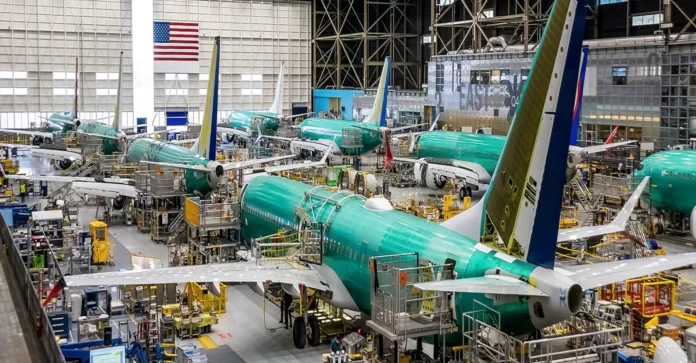Thousands of Boeing workers have launched a strike after rejecting a union-negotiated contract, marking the first major labor stoppage at the aerospace company in 16 years.
The contract was rejected by 95% of the 33,000 workers represented by the International Association of Machinists and Aerospace Workers (IAM). The union had secured a tentative deal that included a 25% raise over four years, improved health care benefits, and a $3,000 ratification bonus.
However, workers were dissatisfied, seeking larger raises and the restoration of pension benefits lost in previous negotiations.
The strike, which is expected to disrupt Boeing’s operations in the Seattle area, comes as the company struggles to recover from a series of safety crises and production delays.
The strike affects Boeing’s main commercial aircraft plants, particularly in Renton and Everett, Washington, where the 737 Max, 767, and 777 models are manufactured. The work stoppage could also strain the company’s supply chain, adding to Boeing’s existing challenges as it tries to stabilise production.
Boeing’s Chief Financial Officer, Brian West, acknowledged the strike’s potential financial impact, stating that it would affect production and deliveries, jeopardizing the company’s recovery efforts. Boeing’s stock fell by more than 3% on Friday, and ratings firm Moody’s is reviewing the company for a possible downgrade, with its current debt standing just above “junk” status.
The last Boeing strike, in 2008, lasted 50 days and cost the company an estimated $3 billion. If the current strike follows a similar timeline, analysts estimate Boeing could face a monthly financial hit of $1.3 billion.
Boeing has faced significant production challenges in recent years, including the fallout from two fatal 737 Max crashes that grounded the plane for nearly two years. Recent safety concerns reemerged when a panel fell off a 737 Max earlier this year, prompting additional inspections and production limits by the Federal Aviation Administration (FAA).
Union leaders, while recommending the tentative agreement, acknowledged that a strike could be financially difficult for some workers, particularly newer employees. The union represents about one-fifth of Boeing’s total workforce, and many of the striking members have less than six years of experience at the company. Despite this, union members were emboldened by recent strikes in other industries, including autoworkers and Hollywood screenwriters.
As negotiations continue, Boeing faces mounting pressure to resolve the dispute and prevent further disruptions to its recovery and reputation in the global aerospace industry.




